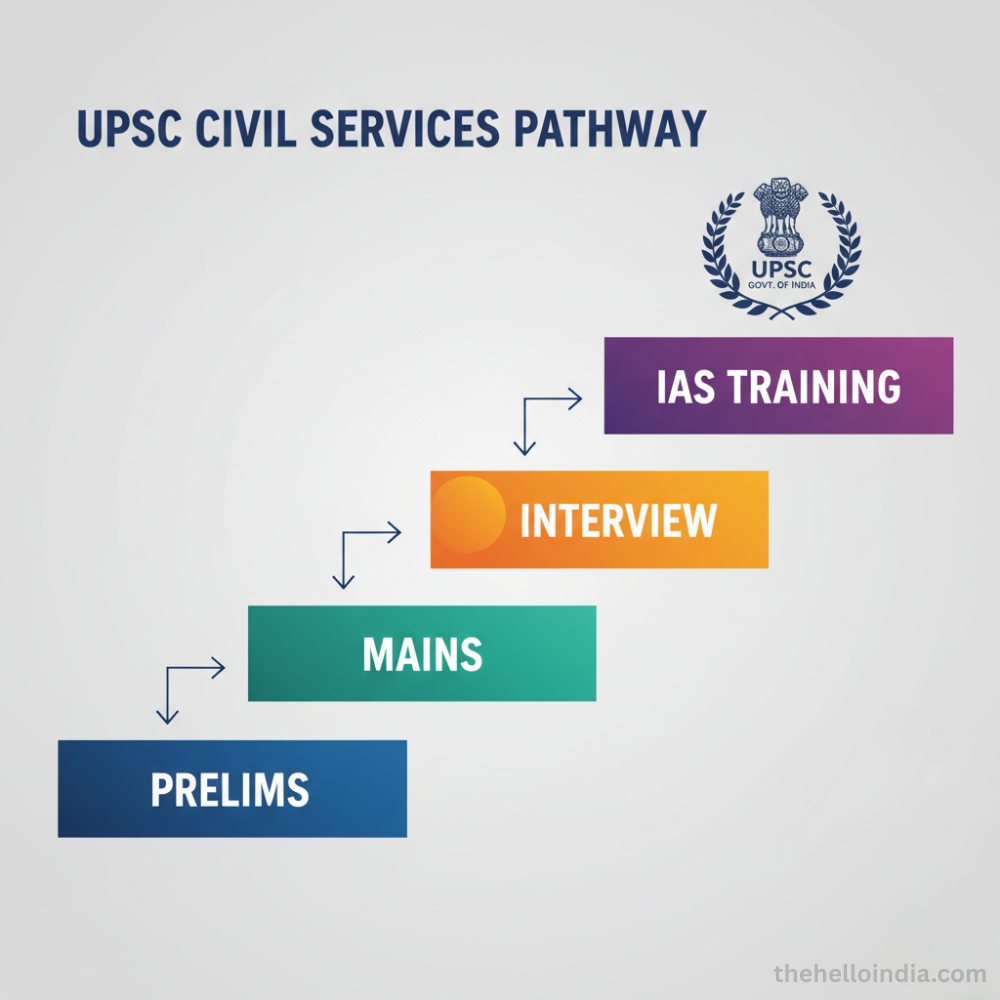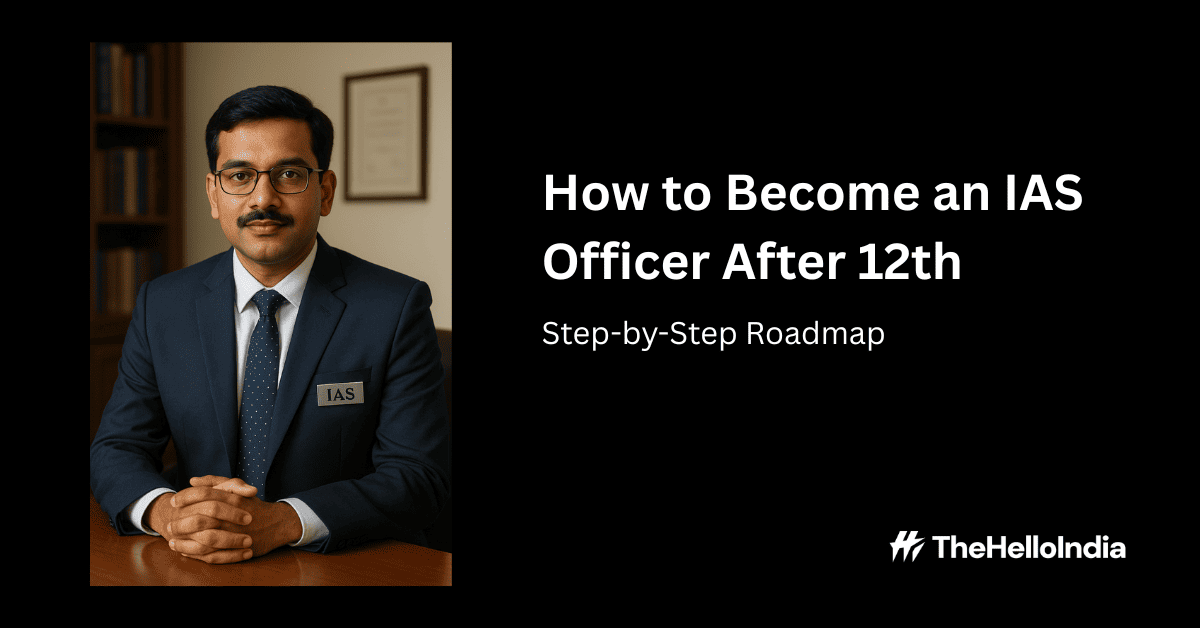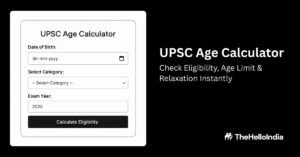Have you just finished class 12 and dream of serving the nation as an IAS officer? You’re not alone. The term how to become an IAS officer after 12th is searched by thousands of aspirants like you. While you cannot directly become an IAS immediately after 12th, you can start your journey smartly from here. In this post, I will walk you through the step-by-step roadmap, strategies, prerequisites, and real tips to keep you ahead of the competition.
If you start wisely now, by the time you complete graduation, you’ll already have a solid UPSC plan in place. Let’s dive in.
1. Eligibility: Why you can’t go straight from 12th to IAS
Minimum qualification required
To appear for the UPSC Civil Services Examination (CSE), a candidate must hold a bachelor’s degree from a recognized university (or be in the final year of such degree).
Thus, passing just class 12 is insufficient for IAS eligibility. You must complete your graduation first.
Age & attempt limits
- You must be 21 years old (minimum) as of August 1 of the year you appear.
- For General category, maximum age is 32 years (as of that date).
- OBC candidates get 3 years relaxation (up to 35 years), SC/ST get 5 years (up to 37).
- Number of attempts also differ: General = 6, OBC = 9, SC/ST = unlimited (till age limit).
So you have time, but you must plan well from graduation onward.
Before you start your IAS preparation, it’s smart to check your eligibility using the UPSC Age Calculator it helps you plan better and avoid disqualification due to age criteria.
2. Choosing the right stream & graduation subject
After 12th, your choice of stream (Science, Commerce, Arts) and then your degree subject can help ease your UPSC preparation.
Which stream to choose?
You can pick any stream (Science, Commerce or Humanities). There’s no restriction. But students from the Humanities / Arts side often feel more comfortable with topics like polity, history, geography, etc. So if your interest lies there, Arts is a good match.
Best degree / subject options
During graduation, you will spend 3-4 years. Pick a subject that:
- Aligns with your interest
- Overlaps with UPSC General Studies or optional papers
- Keeps flexibility for other subjects
Some common choices include:
- BA (Political Science, History, Public Administration, Economics)
- BA (Sociology, Geography, Anthropology, etc.)
- BSc (Geography, Environmental Science, etc.)
- BTech / BSc / BCom — manageable if you manage your time well
Remember: your optional paper in UPSC Mains can sometimes be from your graduation subject.
3. Start your UPSC preparation early (during college)
Don’t wait until your final year. Use your college years to build a foundation.
What you can do from year 1 / year 2
- Read NCERT books (6th to 12th level) in History, Geography, Civics, Economy
- Read daily newspapers and maintain current affairs notes
- Write short essays or opinion pieces about national issues
- Discuss topics with peers, form study groups
What in year 3 / 4
- Dive into standard UPSC books (like “Indian Polity” by Laxmikanth, “Certificate Physical Geography”, etc.)
- Start previous year UPSC prelims question practice
- Join a test series or mock exam group
- Work on time management, answer writing
The aim: by time you reach final year, you’re ready to attempt UPSC Prelims.
4. Understanding the UPSC exam structure

To plan well, you must know how the exam works.
Stage 1: Prelims
- General Studies Paper I – covers history, polity, economy, geography, environment, current affairs
- CSAT (Paper II) – test of reasoning, reading, logical aptitude (qualifying only)
- Marks from Prelims don’t count toward final ranking; it’s a screening test.
Stage 2: Mains
- 9 papers in all:
1. Essay
2. 4 General Studies papers
3. Two optional papers
4. Two qualifying language papers
Your scores in GS + optional + essay determine your mains ranking.
Stage 3: Personality Test / Interview
Candidates who clear Mains are called for interview (275 marks). The panel evaluates your mental alertness, personality, judgment, etc.
Clear all stages and you may be allotted IAS (depending on merit & preferences).
5. Timeline & milestones from 12th to IAS
Below is a suggested roadmap:
| Period | Focus / Goal |
|---|---|
| After 12th | Choose stream; begin reading NCERTs and current affairs |
| Year 1–2 of graduation | Strengthen basics, note-taking, reading |
| Year 3 | Advance study, optional preparation, start mock tests |
| Final year | Ready for Prelims; apply when eligible |
| Post-graduation | Attempt Prelims → Mains → Interview → Join IAS training |
📌 Tip: Many students attempt UPSC in their final year or just after graduation.
6. Tips & strategies for success
- Consistency > intensity: Better to study 1–2 hours daily than cramming
- Smart reading: Focus on overlapping topics (e.g. environment, economy)
- Mock tests & past papers: These sharpen your insight and speed
- Answer writing practice: Write at least 2 essays / GS answers weekly
- Peer groups / mentors: Join discussion groups or coaching if needed
- Stay healthy & balanced: Sleep, breaks, and recreation matter
Also, don’t forget: UPSC has ~0.07 % success rate (in one year over a million applicants). So perseverance and resilience count more than raw talent.
FAQ
Is direct entry to IAS after 12th possible?
No. You must first complete your graduation to become eligible for the UPSC exam.
Which graduation subject gives advantage in IAS preparation?
Subjects like Political Science, History, Public Administration or Geography align well with UPSC topics. But any subject works with proper planning.
When should I begin UPSC preparation?
As early as your first year of graduation. Use your early years to build foundations.
How many attempts do general category applicants get?
Six attempts for General candidates (till max age 32).
Can I attempt UPSC in the final year of graduation?
Yes. If your final year exam results are awaited, you may apply (check UPSC notification).
Conclusion
You might have asked, how to become an IAS officer after 12th? The real answer: you can’t skip steps, but you can start smartly. From choosing the right degree, building strong foundations early, understanding the UPSC exam, to consistent daily effort each step matters.
Don’t wait for graduation to begin your journey. Begin small, stay consistent, and adapt along the way. Are you ready to lay the foundation today for your IAS dream?



